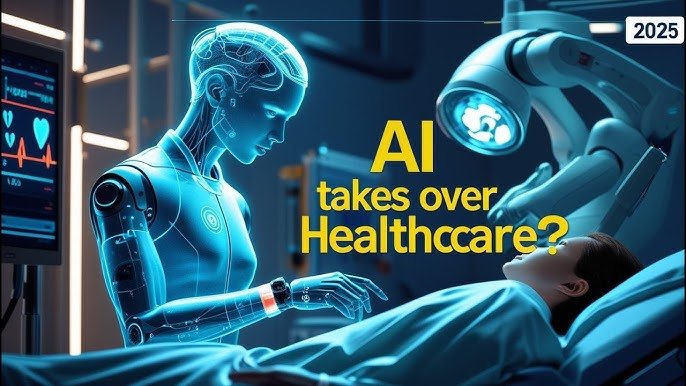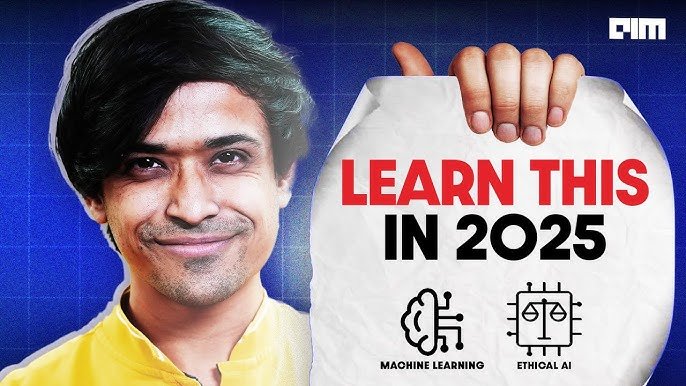“How AI Is Transforming Healthcare in 2025” Artificial Intelligence (AI) is revolutionizing industries worldwide, and healthcare is at the forefront of this transformation. In 2025, AI technologies are reshaping how medical professionals diagnose, treat, and manage patient care, improving efficiency, accuracy, and accessibility. From advanced diagnostics to personalized medicine, AI is driving a new era of healthcare innovation. How AI Is Transforming Healthcare in 2025 This article explores the key ways AI is transforming healthcare in 2025, backed by real-world applications and emerging trends.
1. AI-Powered Diagnostics for Faster, Accurate Results
AI is enhancing diagnostic accuracy by analyzing vast datasets, such as medical images and patient records, with unprecedented speed. In 2025, AI-driven tools like deep learning algorithms are widely used in radiology, pathology, and cardiology.
- Medical Imaging: AI systems, such as those developed by companies like Aidoc, analyze X-rays, MRIs, and CT scans to detect abnormalities like tumors or fractures faster than human radiologists. These tools flag critical cases, reducing diagnostic delays.
- Early Disease Detection: AI models predict diseases like cancer or Alzheimer’s by identifying patterns in patient data. How AI Is Transforming Healthcare in 2025 For example, Google Health’s AI can detect breast cancer in mammograms with accuracy comparable to top radiologists.
- Wearable Integration: AI-powered wearables, like the Apple Watch Series 10, monitor vital signs in real-time, alerting users to irregularities such as atrial fibrillation, enabling early intervention.
By reducing human error and speeding up diagnoses, AI is saving lives and cutting healthcare costs.
2. Personalized Medicine Through AI
Personalized medicine tailors treatments to individual patients based on their genetic makeup, lifestyle, and medical history. In 2025, AI is making this approach more accessible and precise.
- Genomic Analysis: AI platforms like Tempus analyze genetic data to recommend targeted therapies for cancer patients, improving treatment outcomes.
- Drug Development: AI accelerates drug discovery by simulating how compounds interact with the body. In 2025, companies like Insilico Medicine use AI to reduce drug development timelines from years to months.
- Predictive Analytics: AI predicts how patients will respond to treatments, minimizing trial-and-error. For instance, IBM Watson Health uses AI to suggest personalized treatment plans for oncology patients.
This shift to personalized care ensures better outcomes and fewer side effects, transforming patient experiences.
3. AI in Telemedicine and Virtual Care
Telemedicine has surged in popularity, and AI is enhancing its capabilities in 2025. Virtual care platforms are more intuitive, accessible, and efficient thanks to AI integration.
- Virtual Assistants: AI chatbots, like those from Babylon Health, triage patient symptoms, schedule appointments, and provide basic medical advice, reducing the burden on healthcare providers.
- Remote Monitoring: AI-powered devices track chronic conditions like diabetes or hypertension remotely. For example, Medtronic’s AI-enabled insulin pumps adjust dosages in real-time based on glucose levels.
- Mental Health Support: AI apps like Woebot use natural language processing (NLP) to offer cognitive behavioral therapy, making mental health support accessible 24/7.
These advancements make healthcare more inclusive, especially for patients in remote or underserved areas.
4. Streamlining Administrative Tasks
AI is reducing the administrative burden on healthcare professionals, allowing them to focus on patient care. In 2025, AI tools automate time-consuming tasks with high accuracy.
- Medical Transcription: AI-powered transcription tools, like Nuance’s Dragon Medical One, convert doctor-patient conversations into structured medical records, saving hours of manual work.
- Billing and Coding: AI systems streamline medical billing by analyzing patient records and assigning accurate codes, reducing errors and claim denials.
- Appointment Scheduling: AI optimizes hospital schedules by predicting no-shows and allocating resources efficiently, improving operational efficiency.
By automating these tasks, AI frees up time for doctors and nurses, enhancing the overall quality of care.
5. AI in Surgical Precision and Robotics
Robotic surgery, powered by AI, is reaching new heights in 2025. AI-assisted surgical systems improve precision and reduce recovery times.
- Robotic Assistance: Systems like the da Vinci Surgical System use AI to guide surgeons during minimally invasive procedures, improving outcomes in complex surgeries like heart valve repairs.
- Pre-Surgical Planning: AI analyzes patient data to create 3D models of organs, helping surgeons plan procedures with greater accuracy.
- Post-Surgery Monitoring: AI monitors patients post-surgery, detecting complications like infections early through wearable devices and predictive algorithms.
These advancements lead to safer surgeries and faster patient recovery, revolutionizing surgical care.
6. Ethical Considerations and Challenges
While AI’s impact on healthcare is transformative, it comes with challenges that must be addressed in 2025.
- Data Privacy: AI relies on vast amounts of patient data, raising concerns about security and compliance with regulations like HIPAA and GDPR.
- Bias in Algorithms: AI models can inherit biases from training data, potentially leading to unequal care. Efforts are underway to ensure diverse datasets and transparent algorithms.
- Adoption Barriers: High costs and resistance to change among healthcare providers can slow AI adoption, particularly in underfunded systems.
Addressing these challenges is critical to ensuring AI’s benefits are equitable and sustainable.
7. The Future of AI in Healthcare
Looking ahead, AI’s role in healthcare will continue to expand in 2025 and beyond. Emerging trends include:
- AI-Driven Drug Repurposing: AI identifies new uses for existing drugs, speeding up treatment availability.
- Predictive Population Health: AI analyzes public health data to predict and prevent disease outbreaks, as seen in early COVID-19 detection models.
- Integration with IoT: The Internet of Things (IoT) will pair with AI to create smart hospitals, optimizing everything from patient care to energy use.
As AI technology evolves, its potential to make healthcare more efficient, accessible, and personalized will only grow.
How AI Is Transforming Healthcare in 2025
Artificial intelligence is revolutionizing healthcare in 2025, making medical services faster, more accurate, and more personalized than ever before. How AI Is Transforming Healthcare in 2025 From diagnostics to treatment planning, AI technologies are enhancing every aspect of patient care.
One of the biggest impacts is in diagnostics. AI-powered imaging tools can detect diseases like cancer, heart conditions, and neurological disorders earlier than traditional methods. How AI Is Transforming Healthcare in 2025 By analyzing vast amounts of medical data, these systems help doctors make informed decisions, reducing human error and improving patient outcomes.
How AI Is Transforming Healthcare in 2025 Personalized medicine is another area benefiting from AI. Algorithms analyze a patient’s genetic profile, lifestyle, and medical history to create tailored treatment plans.
Conclusion
How AI Is Transforming Healthcare in 2025, AI is transforming healthcare by improving diagnostics, personalizing treatments, enhancing virtual care, streamlining administration, and advancing surgical precision. While challenges like data privacy and algorithmic bias remain, the benefits of AI are undeniable. How AI Is Transforming Healthcare in 2025 By embracing these technologies, healthcare providers can deliver better outcomes, reduce costs, and make quality care accessible to all. Stay tuned to these trends to understand how AI will continue to shape the future ofHow AI Is Transforming Healthcare in 2025 healthcare.









